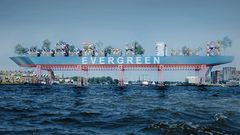The international platform Non Architecture regularly announces competitions. In this architecture contest, participants were asked to design a cycling bridge in the context of Amsterdam, an effective connection over the river Ij for pedestrians and cyclists – in form of one design expressed in three drawings: The Netherlands are renowned for their popular biking culture, which made the country a world reference when it comes to cycling infrastructure. The city of Amsterdam embeds the value of slow mobility and biking, but today it lacks a cross river connection for cyclists and pedestrians. As designers, how can we think of a bridge that would match the conflicting interests of citizens and autorities? How can a bridge become an architectural icon for the waterfront of Amsterdam?
The competition "Amsterdam Cycling Bridge" aimed to answer those questions by inviting designers to create solutions that might visualize new/old opportunities and challenges, bringing the realization of a bridge one step closer.
The 1st prize winning project "Evergreen Amsterdam" by Stephan Adelbrecht and Florian Muhr addresses Amsterdam's problems of limited accessibility of Amsterdam Noord and, above all, the acute shortage of housing and land for a rapidly growing population. The project shows a potential for redensification on land previously thought to be undevelopable - the canal.
Furthermore, the design takes into account the urban development of the eastern harbor basin, away from its original commercial use, towards a new neighborhood. For a sustainable efficient urbanization of the whole area, the concept goes beyond a mere connection of the northern area and offers a new urban space to merge it with the city.
In formal terms, the project innovatively combines current problems with the city's extensive history as one of the former largest trading ports. The transformation of a discarded container ship provides sufficient infrastructural storage space inside and, on top of that, the former deck serves as a green residential bridge. Houses made from former containers provide affordable housing and can be effectively delivered and constructed by sea.
"Evergreen Amsterdam" conveys a multi-layered and sustainable approach to solving the city's current problems and adequately packages them for the predestined location as a potential new landmark for Amsterdam.
